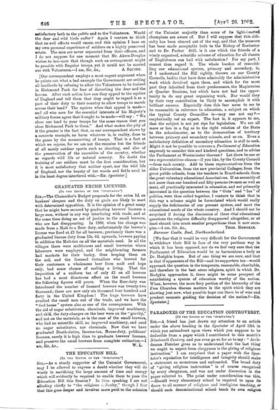THE EDUCATION BILL.
rro THE EDITOR OF TEE 'SPEOTATOR.1 SIE,-.-A9 a steady supporter of the Unionist Government, may I be allowed to express a doubt whether they will do wisely in sacrificing the large amount of time and energy which will evidently be required to enable them to pass the Education Bill this Session ? In thus speaking I am not alluding chiefly to "the religious oi.fficulty," though I fear that this goes deeper and involves more peril to the cohesion of the Unionist majority than some of its light-Learted champions are aware of. But I will suppose that this diffi- culty has been cleared out of the way, and that the measure has been made acceptable both to the Bishop of Rochester and to Dr. Parker Still, is it one which the friends of a wisely organised, scientific scheme of education for all classes of Englishmen can hail with satisfaction ? For my part, I cannot thus regard it. The whole burden of remodel- ling our educational system, primary and secondary, is, if I understand the Bill rightly, thrown on our County Councils, bodies that have done admirably the administrative work which devolved upon them, and which for the most part they inherited from their predecessors, the Magistrates at Quarter Sessions, but which have not had the oppor- tunity to do any great organising work. Nor would they by their very constitution be likely to accomplish it with brilliant suocess. Especially does this fear seem to me to be reasonable in reference to education, a subject on which the typical County Councillor is—may one not say F- emphatically not an expert. The fact is, it appears to me, that the subject is not yet ripe for legislation. We are all more or less in a fog as to the right relation of the State to the schoolmaster, as to the demarcation of territory between primary and secondary schools, and so on. Even a satisfactory definition of secondary education is still to seek. Might it not be possible to convene a Parliament of Education expressly to consider this and kindred questions, and to advise the Parliament at Westminster thereon ? Let there be one or two representatives chosen—if you hke, by the County Council —from each county. Add to these representatives from the older Universities, from the new provincial Colleges, from the great public schools, from the teachers in Board-schools. from the great voluntary educational Associations. If an assembly of not more than one hundred and fifty persons (women as well as men), all practically interested in education, and not primarily interested in the question between the "Outs and " Ins " of politics, were thus called together, I venture to think that in this way a scheme might be formulated which would really supply the deficiencies of our present system, and meet the educational needs of the whole country. And I should not be surprised if during the discussion of these vital educational questions the religions difficulty disappeared altogether, or at least shrank into much smaller proportions than it now occu- [We fear that it would be very difficult for the Government to withdraw their Bill in face of the very partisan way in which it has been opposed, nor do we feel very sure that the Parliament of Education would be as harmonious a body as Dr. Hodgkin hopes. But of one thing we are sure, and that is that if opponents of the Bill—and its supporters too—would approach the question in the temperate, reasonable, charitable, and therefore in the bast sense religious, spirit in which Dr. Hodgkin approaches it, there might be some prospect of establishing a system of education worthy of the nation. When, however, the more fiery portion of the hierarchy of the Free Churches discuss matters in the spirit which they are showing just now, what possible hope can there be of wise and prudent counsels guiding the decision of the nation P—Eb. Spectator.]


























































 Previous page
Previous page